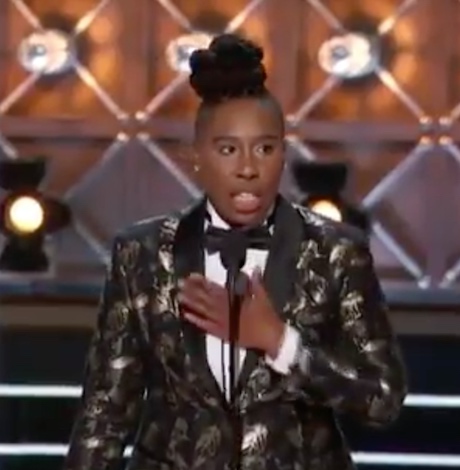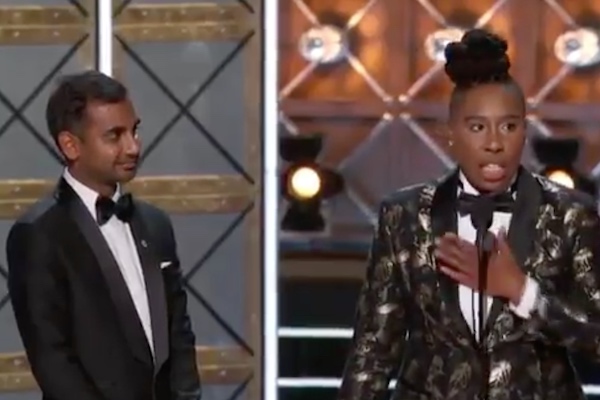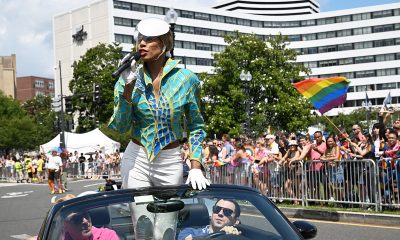Arts & Entertainment
‘The Handmaid’s Tale,’ Lena Waithe win big at politically charged Emmys
the Hulu series won a total of eight awards for the night


(Aziz Ansari and Lena Waithe accept the award for Outstanding Writing for a Comedy Series. Screenshot via Twitter.)
The 69th Primetime Emmy Awards was filled with historic wins, political humor and some LGBT representation on Sunday night.
Hosted by late night talk show host Stephen Colbert, the awards ceremony wasn’t short on digs at the Trump administration. Colbert’s opening monologue was riddled with Trump references. In one of the most surprising moments of the night, Sean Spicer made an appearance wheeling out a podium as a nod to Melissa McCarthy’s portrayal of him on “Saturday Night Live.”
“This will be the largest audience to witness the Emmys, period,” Spicer told the shocked crowd.
Dolly Parton, Jane Fonda and Lily Tomlin joined together for a “Nine to Five” reunion on stage and took their own aim at Trump.
“Back in 1980, in that movie we refused to be controlled by a sexist, egotistical, lying, hypocritical bigot,” Fonda began.
“And in 2017, we still refuse to be controlled by a sexist, egotistical, lying, hypocritical bigot,” Tomlin finished to the cheers of the crowd.
The “9 to 5” stars take aim: “In 2017, we still refuse to be controlled by a sexist, egotistical, lying, hypocritical bigot.” #Emmys pic.twitter.com/rvZVu4MfgP
— Jarett Wieselman (@JarettSays) September 18, 2017
RuPaul also made an appearance as a living Emmy statue being quizzed by Colbert on her dating life with other award statues.
.@RuPaul plays “Emmy” at the #Emmys, disses other awards shows https://t.co/wvJkc1TOJl pic.twitter.com/2zPdvcZPoG
— Hollywood Reporter (@THR) September 18, 2017
Dave Chappelle presented the award for Outstanding Director in a Comedy Series and brought attention to D.C. Public Schools with a random shoutout.
“All right, now I’m going to read this teleprompter. Shout out to D.C. Public Schools, here we go,” Chappelle, who is an alumni of Duke Ellington School of the Arts, joked.
Later in the night while accepting his award for Outstanding Writing for a Variety Series, comedian John Oliver asked to get D.C. Public Schools trending on Twitter. His plea was heard and the hashtag was trending nationally.
The awards of the night marked firsts for many who held the statue on stage.
Lena Waithe made history for winning an Emmy for Outstanding Writing for a Comedy Series for co-writing the episode “Thanksgiving” on “Master of None” with the show’s co-creator, Aziz Ansari. She is the first black woman to receive the honor.
“Thanksgiving,” tells the story of how Waithe’s character Denise comes to terms with her sexuality and coming out in a black family over a series of family Thanksgivings. Waithe thanked her girlfriend while accepting the award and gave a special shoutout to her “LGBTQIA family.”
“I see each and every one of you,” Waithe says. “The things that make us different – those are our superpowers. Every day when you walk out the door and put on your imaginary cape and go out there and conquer the world, because the world would not be as beautiful as it is if we weren’t in it. And for everybody out there that showed us so much love for this episode, thank you for embracing a little Indian boy from South Carolina and a queer black girl from the South Side of Chicago.”
Awesome message from Lena Waithe during her #Emmys acceptance speech. #Emmys2017 #EmmyAwards pic.twitter.com/Ln1sKck8Xt
— Josh Sánchez (@jnsanchez) September 18, 2017
Donald Glover became the first black person to win both Outstanding Lead Actor in a Comedy Series and for comedy directing for his work on “Atlanta.” Julia Louis-Dreyfus won for Outstanding Lead Actress in a Comedy Series for her role on “Veep,” making her the record-holder for most Emmys won for the same role in the same series.
Sterling K. Brown was the first black man to win Outstanding Lead Actor in a Drama Series for “This is Us” since Andre Braugher won in 1998. Riz Ahmed took home Outstanding Lead Actor in a Limited Series for “The Night Of,” making him the first South Asian man to receive the honor.
Kate McKinnon won Outstanding Supporting Actress in a Comedy Series and thanked Hillary Clinton, who she frequently portrayed on “Saturday Night Live.”
“San Junipero,” from the sci-fi Netflix series “Black Mirror,” also received awards for Outstanding Television Movie and Outstanding Writing in a Limited Series or Movie. “San Junipero” follows an interracial, lesbian couple who fall in love in a simulated, alternate reality. It’s often been praised for its positive portrayal of an LGBT relationship and for having a happy ending.
“The Handmaid’s Tale” swept the Emmys, winning a total of eight awards including Outstanding Drama Series and Outstanding Lead Actress in a Drama Series for Elisabeth Moss.
List of winners below.
Outstanding Lead Actor in a Drama Series
Sterling K. Brown- “This Is Us”
Anthony Hopkins, “Westworld”
Bob Odenkirk, “Better Call Saul”
Matthew Rhys, “The Americans”
Liev Schreiber, “Ray Donovan”
Kevin Spacey”House of Cards”
Milo Ventimiglia, “This Is Us”
Outstanding Lead Actress in a Drama Series
Viola Davis, “How to Get Away With Murder”
Claire Foy, “The Crown”
Elisabeth Moss, “The Handmaid’s Tale”
Keri Russell, “The Americans”
Evan Rachel Wood, “Westworld”
Robin Wright, “House of Cards”
Outstanding Supporting Actor in a Drama Series
Jonathan Banks, “Better Call Saul”
Ron Cephas Jonas, “This Is Us”
David Harbour, “Stranger Things”
Michael Kelly, “House of Cards”
John Lithgow, “The Crown”
Mandy Patinkin, “Homeland”
Jeffrey Wright , “Westworld”
Outstanding Supporting Actress in a Drama Series
Ann Dowd, “The Handmaid’s Tale”
Samira Wiley, “The Handmaid’s Tale”
Uzo Aduba, “Orange Is the New Black”
Millie Bobby Brown, “Stranger Things”
Chrissy Metz, “This Is Us”
Thandie Newton, “Westworld”
Outstanding Lead Actor in a Comedy Series
Anthony Anderson, “Black-ish”
Aziz Ansari, “Master of None”
Zach Galifianakis, “Baskets”
Donald Glover, “Atlanta”
William H. Macy, “Shameless”
Jeffrey Tambor, “Transparent”
Outstanding Lead Actress in a Comedy Series
Pamela Adlon, “Better Things”
Jane Fonda, “Grace and Frankie”
Allison Janney, “Mom”
Ellie Kemper, “Unbreakable Kimmy Schmidt”
Julia Louis-Dreyfus, “Veep”
Tracee Ellis Ross, “Black-ish”
Lily Tomlin, “Grace and Frankie”
Outstanding Supporting Actor in a Comedy Series
Louie Anderson, “Baskets”
Alec Baldwin, “Saturday Night Live”
Tituss Burgess, “Unbreakable Kimmy Schmidt”
Ty Burrell, “Modern Family”
Tony Hale, “Veep”
Matt Walsh, “Veep”
Outstanding Supporting Actress in a Comedy Series
Vanessa Bayer, “Saturday Night Live”
Leslie Jones, “Saturday Night Live”
Kate McKinnon, “Saturday Night Live”
Kathryn Hahn, “Transparent”
Judith Light, “Transparent”
Anna Chlumsky, “Veep”
Outstanding Lead Actor in a Limited Series or Movie
Riz Ahmed, “The Night Of”
Benedict Cumberbatch,” Sherlock”
Robert De Niro, “Wizard of Lies”
Ewan McGregor, Fargo
Geoffrey Rush, Genius
John Turturro, The Night Of
Outstanding Limited Series
“Big Little Lies”
“Fargo”
“Feud: Bette and Joan”
“The Night Of”
“Genius”
Best TV Movie
“Black Mirror: San Junipero”
“Dolly Parton’s Christmas of Many Colors”
“The Immortal Life of Henrietta Lacks”
“Sherlock: The Lying Detective”
“The Wizard of Lies”
Outstanding Lead Actor in a Limited Series
Riz Ahmed, “The Night Of”
Benedict Cumberbatch, “Sherlock: The Lying Detective”
Robert De Niro, “The Wizard of Lies”
Ewan McGregor, “Fargo”
Geoffrey Rush, “Genius”
John Turturro, “The Night Of”
Outstanding Lead Actress in a Limited Series
Carrie Coon, “Fargo”
Felicity Huffman, “American Crime”
Nicole Kidman, “Big Little Lies”
Jessica Lange, “Feud: Bette and Joan”
Susan Sarandon, “Feud: Bette and Joan”
Reese Witherspoon, “Big Little Lies”
Outstanding Supporting Actress in a Limited Series or Movie
Judy Davis, “Feud: Bette and Joan
Laura Dern, “Big Little Lies”
Jackie Hoffman,”Feud: Bette and Joan”
Michelle Pfeiffer, “The Wizard of Lies”
Shailene Woodley, “Big Little Lies”
Outstanding Supporting Actor in a Limited Series or Movie
Bill Camp, “The Night Of”
Alfred Molina, “Feud: Bette and Joan”
Alexander Skarsgard, “Big Little Lies”
David Thewlis, “Fargo”
Stanley Tucci, “Feud: Bette and Joan”
Michael Kenneth Williams, “The Night Of”
Outstanding Variety Talk Series
“Full Frontal With Samantha Bee”
“Jimmy Kimmel Live!”
“Last Week Tonight With John Oliver”
“The Late Late Show With James Corden”
“The Late Show With Stephen Colbert”
“Real Time With Bill Maher”
Outstanding Reality-Competition Program
“The Amazing Race”
“American Ninja Warrior”
“Project Runway”
“RuPaul’s Drag Race”
“Top Chef”
“The Voice”
Outstanding Directing for a Comedy Series
Jamie Babbit, “Silicon Valley”
Donald Glover, “Atlanta”
Mike Judge, “Silicon Valley”
David Mandel, “Veep”
Morgan Sackett, “Veep”
Dale Stern, “Veep”
Outstanding Writing for a Drama Series
The Duffer Brothers, “Stranger Things”
Lisa Joy and Jonathan Nolan, “Westworld”
Peter Morgan, “The Crown”
Bruce Miller, “The Handmaid’s Tale”
Gordon Smith, “Better Call Saul”
Joe Weisberg and Joel Fields, “The Americans”
Outstanding Writing for a Comedy Series
Aziz Ansari and Lena Waithe, “Master of None”
Alec Berg, “Silicon Valley”
Donald Glover, “Atlanta”
Stephen Glover, “Atlanta”
Billy Kimball, “Veep”
David Mandel, “Veep”
Best Writing for a Limited Series, Movie or Dramatic Special
Charlie Brooker, “Black Mirror: San Junipero”
David E. Kelley, “Big Little Lies”
Noah Hawley, “Fargo”
Ryan Murphy, “Feud: Bette and Joan”
Jaffe Cohen, Michael Zam & Ryan Murphy, “Feud: Bette and Joan”
Richard Price & Steven Zaillian, “The Night Of”
Outstanding Directing for a Drama Series
Stephen Daldry, “The Crown”
Kate Dennis, “The Handmaid’s Tale”
The Duffer Brothers, “Stranger Things”
Vince Gilligan, “Better Call Saul”
Lesli Linka Glatter, “Homeland”
Reed Morano, “The Handmaid’s Tale”
Jonathan Nolan, “Westworld”
Television
ICYMI: ‘Overcompensating’ a surprisingly sweet queer treat
A sweet, savvy show about breaking free to embrace your true self

Pride month 2025 is now behind us, and while it’s safe to say that this year’s celebrations had a darker edge than usual, it’s also true that they came with a particularly rich bounty of new queer movies and shows to entertain us – so many, in fact, that even if we are facing a lull until the fall another harvest of fresh content, there are still plenty of titles – which, for whatever reason, were off your radar – for you to catch up on in the meantime.
One of the most notable of these – the bingeworthy series “Overcompensating” (now streaming on Amazon Prime) – will most definitely have been ON the radar for the plentiful fans of creator and star Benito Skinner, the actor/comedian who rose to viral fame through his content on platforms like Instagram, YouTube, and TikTok. For anyone else, it might have easily slipped through the cracks.
Created and written by Skinner as a loosely autobiographical “college comedy,” it aims for the kind of raucous, explicitly sexed-up tone one expects from the genre as it centers on Benny (Skinner), newly arrived as a freshman at prestigious Yates University. A former football jock and “golden boy” at his midwestern high school, he’s the picture of idealized youthful masculinity; he’s also deep in the closet, struggling to keep his sexuality hidden and maintain his macho front under the intense scrutiny of the college’s social scene – and under the resentful eye of his older sister Grace (Mary Beth Barone), who has already secured her own place at the top of the pecking order.
In the first episode, Benny’s difficulties are eased when he meets Carmen (Wally Baram), another freshman trying to navigate the politics of college life; a gamer from a home marred by tragedy, she’s an outsider who feels like she’s putting on an act, too, and they click – giving him the convenient “cover” of female companionship while providing them both with much-needed support and encouragement. He’s also befriended by a handsome film major from England (Rish Shah), who has already caught his eye, stirring other kinds of feelings and possibly even reciprocating them. Meanwhile, he’s being courted by the school’s “exclusive secret society” – headed by his sister’s aggressively “alpha” boyfriend Pete (Adam DiMarco) – and trying to stay interested in his studies, despite a growing realization that a career in business doesn’t actually appeal to him all that much.
That’s a lot to juggle for anybody, even an overachiever like Benny – whose “lucky” life so far has largely been the result of playing a role he is finding harder and harder to maintain. As the series goes on through its eight-episode arc, it becomes clear that he’s not the only one who is “keeping up appearances,” and he, along with the other confused and damaged young people in his orbit, begins the painful (but often hilarious) process of evolution that is required in order to become truly oneself.
Directed toward appealing to a younger demographic, “Overcompensating” is the kind of show that requires a few episodes worth of invested time to make an impression that feels like substance. Full of the bawdy farcical antics that go hand in hand with stories about hormonally charged college kids, it’s not above leaning into the formulas and tropes that have always driven these kinds of comedies. At first, while its broadly comedic strokes and frequently explicit sexual hijinks might elicit plenty of chuckles, the show might easily feel tiresome for more mature audiences; there’s a nostalgic fun to it, made even more appealing, somehow, by the “political incorrectness” of its frequently sexist and homophobic humor, but for a while things may feel like an unnecessary attempt to reinvent “Animal House” for the Gen Z crowd.
By the time the season reaches its halfway point, however, things have started to get real. The antics of these horny almost-adults take on a more pointed absurdity, informed by the increasingly tangled web of defensive deceit they weave among themselves – and, as things draw toward a cliffhanger climax, the consequences of maintaining it – until it achieves a sense of empathy toward them all. There’s a wisdom that smacks of lived authenticity underlying the whole affair, transforming it from the “sexploitative” teen comedy of its surface into something deeper. To be sure, things stay expectedly wacky, and the soap-operatic melodrama of its twists and reversals continue to maintain the show’s “mature YA” appeal; but beneath those trappings, by the end of the season a truer identity has begun to emerge, just as its characters have begun to find their own levels of self-actualization for themselves.
As creator, primary writer, and star, it’s obviously Skinner who deserves much of the credit. While it might be tempting, early on, to dismiss the show as an “ego project,” the internet-spawned sensation proves his talents quickly enough to get past such judgy suspicions, delivering a pitch-perfect blend of sauciness and sensitivity that extends its appeal toward both ends of the taste spectrum; just as crucially, he brings the same aforementioned “lived authenticity” to his winning performance – after all, he’s essentially playing himself in a fictionalized version of his own life – while also making sure that equal time (and compassion) is afforded all the other characters around him, each of whom are pushing at the boundaries of their own respective “closets,” too. It’s unavoidable to notice that – like most of his co-stars – he’s plainly a decade too old to be playing a college student; but by the time we reach that crucial halfway turning point, we’ve become too engaged by him to care.
The show is full of excellent performances, in fact. Relative newcomers Baram and Barone offer layers of complex nuance, while the more familiar DiMarco (“White Lotus”) is close to heartbreaking as the toxic BMOC clinging to the illusion of power as his life begins unraveling around him. Other standouts include the mononymic actress Holmes as Carmen’s “wild child” roommate, solidly likable turns as Benny’s parents from mature veterans Connie Britten and Kyle MacLachlan (whose presence, along with stylish elements in several key scenes, hints at an homage-ish nod to the late David Lynch), and podcaster Owen Thiele as an openly gay fellow student who has Benny “clocked” from the moment they meet. Finally, Lukas Gage makes a deep impression as a former high school teammate at the heart of Benny’s most haunting memory.
There’s no official word yet on whether “Overcompensating” will be renewed for a second season, despite the multiple loose ends left dangling at the end of its first; it has proven to be popular, and Skinner’s large fanbase makes it likely that the story will continue. Even if it doesn’t, the place of uncertainty in which it has left its characters rings true enough to serve as a satisfying endpoint.
As for us, we hope that won’t happen. For all its sophomoric humor, generic plot twists, and purposefully gratuitous sexual titillation, it’s one of the sweetest, kindest, and most savvy shows we’ve seen about breaking free from conformity to embrace your true self – and that’s a message that applies whether you’re queer, straight, or anywhere in between.
Photos
PHOTOS: Independence Day Weekend in Rehoboth
Wicked Green Pool Party, fireworks among festivities

Vacationers and residents alike enjoyed Independence Day Weekend activities in Rehoboth Beach, Del. The Wicked Green Pool Party drew hundreds to the CAMP Rehoboth fundraiser on Saturday. That evening, revelers went to the rooftops to watch the fireworks display.
(Washington Blade photos by Daniel Truitt)













Music & Concerts
Red, White, and Beyoncé: Queen Bey takes Cowboy Carter to D.C. for the Fourth of July
The legendary music icon performed on July 4 and 7 to a nearly sold-out Northwest Stadium.

Just in time for Independence Day, Beyoncé lit up Landover’s Commanders Field (formerly FedEx Field) with fireworks and fiery patriotism, bringing her deeply moving and genre-defying “Cowboy Carter” tour to the Washington, D.C. area.
The tour, which takes the global icon across nine cities in support of her chart-topping and Grammy-winning country album “Cowboy Carter,” landed in Prince George’s County, Maryland, over the Fourth of July weekend. From the moment Beyoncé stepped on stage, it was clear this was more than just a concert — it was a reclamation.
Drawing from classic Americana, sharp political commentary, and a reimagined vision of country music, the show served as a powerful reminder of how Black Americans — especially Black women — have long been overlooked in spaces they helped create. “Cowboy Carter” released in March 2024, is the second act in Beyoncé’s genre-traversing trilogy. With it, she became the first Black woman to win a Grammy for Best Country Album and also took home the coveted Album of the Year.
The record examines the Black American experience through the lens of country music, grappling with the tension between the mythology of the American Dream and the lived realities of those historically excluded from it. That theme comes alive in the show’s opening number, “American Requiem,” where Beyoncé sings:
“Said I wouldn’t saddle up, but
If that ain’t country, tell me, what is?
Plant my bare feet on solid ground for years
They don’t, don’t know how hard I had to fight for this
When I sing my song…”
Throughout the performance, Beyoncé incorporated arresting visuals: Black cowboys on horseback, vintage American iconography, and Fox News clips criticizing her genre shift — all woven together with voiceovers from country legends like Dolly Parton and Willie Nelson. The result was a multimedia masterclass in storytelling and subversion.
The “Cowboy Carter” tour has been a social media sensation for weeks, with fans scrambling for tickets, curating elaborate “cowboy couture” outfits, and tailgating under the summer sun. At Commanders Field, thousands waited in long lines for exclusive merch and even longer ones to enter the stadium — a pilgrimage that, for many, felt more like attending church than a concert.
One group out in full force for the concert was Black queer men — some rocking “denim on denim on denim on denim,” while others opted for more polished Cowboy Couture looks. The celebration of Black identity within Americana was ever-present, making the concert feel like the world’s biggest gay country-western club.
A standout moment of the night was the appearance of Beyoncé’s 13-year-old daughter, Blue Ivy Carter. Commanding the stage with poise and power, she matched the intensity and choreography of her mother and the professional dancers — a remarkable feat for someone her age and a clear sign that the Carter legacy continues to shine.
It’s been nearly two decades since Beyoncé and Destiny’s Child parted ways, and since then, she’s more than lived up to her title as the voice of a generation. With “Cowboy Carter,” she’s not just making music — she’s rewriting history and reclaiming the space Black artists have always deserved in the country canon.
-

 Federal Government2 days ago
Federal Government2 days agoTreasury Department has a gay secretary but LGBTQ staff are under siege
-

 Virginia2 days ago
Virginia2 days agoDefying trends, new LGBTQ center opens in rural Winchester, Va.
-

 District of Columbia1 day ago
District of Columbia1 day agoGay GOP group hosts Ernst, 3 House members — all of whom oppose Equality Act
-

 Opinions4 days ago
Opinions4 days agoUSAID’s demise: America’s global betrayal of trust with LGBTQ people












